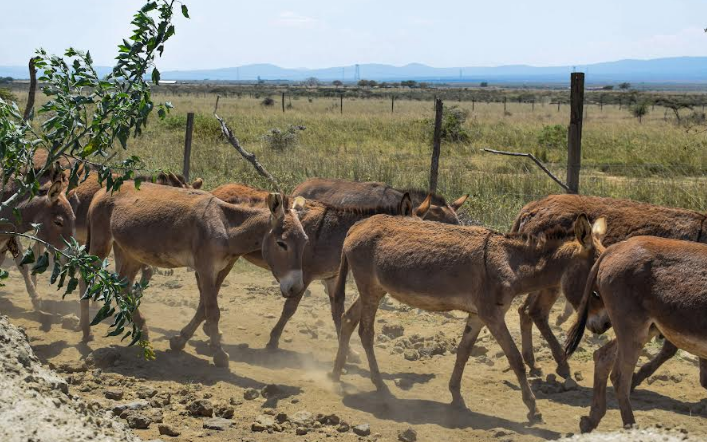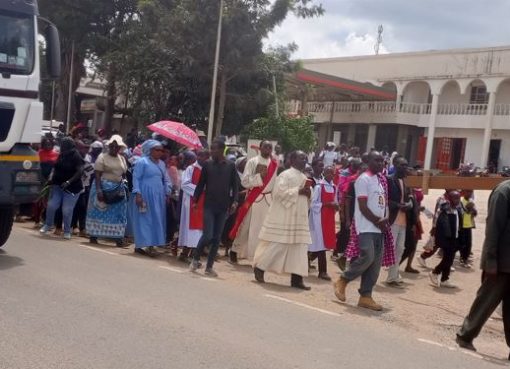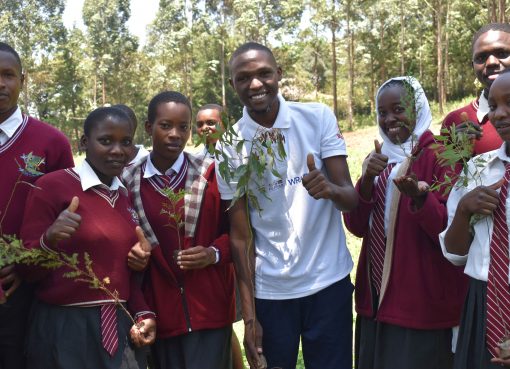This is also a special time for Christians around the globe as they come together to celebrate the birth of Jesus Christ.
During this season, beef, pork, and mutton are precious delicacies dominating almost every meal enjoyed by families, friends, and organisations during their end-of-year parties.
However, Kenyans have been warned not to fall in the trap of eating bush meat owing to the mass slaughter of donkeys in part of the country, and especially in pastoralist communities that are known for livestock keeping.
The concern of increasing donkey slaughter made two pastoralists’ communities, Narok and Kajiado counties, to come together to draw a strategy on how to end the rampant illegal practice in the county.
The baraza held at Ewaso Kidong area at the border of Narok and Kajiado counties was led by the Narok County Commissioner Kipkech Lotiatia and his Kajiado counterpart Taari Rwaria, where they put a strategy on ending the illegal donkey slaughter during this festival season.
Lotiatia disclosed that tens of donkeys have been nabbed in the recent past being transported along the Bomet-Mulot-Narok-Suswa highway before branching at Suswa to the Ewaso Kidong area, where they are believed to be slaughtered in the thickest bushes of the Ewaso Kidong area.
In a bid to end this illegal trade, Lotiatia announced that the two counties have agreed to ban the transportation of donkeys, saying anyone found transporting donkeys from one location to another without a valid permit will be deemed as an illegal donkey trader.
“From now henceforth, any person caught transporting a herd of donkeys without a valid permit will be arrested. I ask the members of the public to be vigilant and give information of any illegal transportation of donkeys,” he said.
He underscored his office’s commitment to work with all organisations that deal with animal welfare to enforce the law on animal protection.
Lotiatia warned influential leaders involved in the donkey trade, saying no one will be spared in the fight to protect donkeys.
“We know that there are some influential leaders inside this illegal business, but we will ensure it ends,” he said, warning those supporting the illegal business that they would be arrested and prosecuted.
“It is known in all the Maa communities that they do not eat donkey meat; why is it that today you are accepting the animals to be slaughtered in your area?” posed Lotiatia.
He called on all stakeholders, among them religious leaders, councils of elders, women, and youth groups, to help fight the vice by sensitising the community and reporting those involved in the illegal act.
On his part, the Kajiado County Commissioner called on young people not to accept being used to slaughter the donkeys at a cheap fee.
He reiterated that the authorities were more careful this festival season as the consumption of meat is expected to go high.
He observed that most people involved in the illegal activity are young people, advising them to venture into other profitable jobs that will earn them an income.
Rwaria said they will continue collaborating with other neighbouring counties like Kiambu and Nakuru to ensure zero movement of donkeys from one county to another.
Evangelical Alliance of Kenya, Kajiado branch Chairperson Bishop Dr. Stephen Gitonga reiterated that the church supports the protection of donkeys as a donkey is portrayed as a holy animal in the bible.
He warned Christians that mistreating a donkey and slaughtering it in an inhumane way is against the laws of the country and biblical teachings.
Mzee Ole Kondonyo, a village elder at Ewaso Kidong, reiterated their efforts to control donkey slaughter by reporting those who attempted to slaughter donkeys in the area.
Another elder, Mzee Koilel Ole Nyongo, said since he was born in 1963, he has not seen a donkey being slaughtered for food.
Instead, he said a donkey is a domestic animal that helps in the transportation of goods, even on rough roads that are impassable for vehicles.
“Those who come to hide in our area to slaughter donkeys must be exposed. I am a farmer of four donkeys, and I would not wish to see them being slaughtered in an inhumane manner for food,” he said.
Dr. Yegon Kibet of Farming System Kenya (FSK) lamented the dwindling donkey population, saying statistics from the Kenya National Bureau of Statistics (KNBS) in 2019 showed that the population of donkeys in the country was 1.9 million.
However, the population has decreased to less than a million because of the high demand for donkey skins and private parts.
“Donkey skin is used to make traditional medicine ejiao. Ejiao is made using gelatin extracted from boiled donkey hides. It is alleged that the medicine supplements lost blood, delays ageing, increases libido, treats side effects of chemotherapy, and prevents infertility, miscarriage, and menstrual irregularity,” said Dr. Kibet.
The donkeys are mainly being slaughtered in the bushes because the state closed donkey slaughter houses in 2020, making it illegal to slaughter donkeys.
The major concern, he said, is that the donkeys are being slaughtered in the bushes, making the meat unhealthy for human consumption as they risk contracting zoonotic diseases, like anthrax and rabies, that are very fatal.
“What we are doing as FSK is to sensitise both the members of the public and authorities on the dangers of bush meat so that together we can end this practice,” he said.
He revealed that recently, they rescued over 200 donkeys that were being transported towards the Ewaso Kidong area for slaughter.
The veterinary doctor called on residents to ensure they buy meat from sanctified abettors and butchers, saying any meat that is inspected has a stamp.
According to a report compiled by the Kenya Agricultural and Livestock Research Organisation (KALRO), in 2022, the general perception of the donkey population is that it has reduced considerably, and the situation is expected to worsen if nothing is done to protect the animals.
The decrease in population was attributed to the sale of donkeys for slaughter and rampant donkey theft.
The report also showed that donkeys have a slow rate of reproduction attributed to a long gestation period of 12 months and low chances of conception in working donkeys subjected to intense work, a free-ranging management system, and long periods of nursing calves.
The donkey population is also threatened by death as a result of diseases like tetanus, diarrhoea, and accidents.
The report showed there has been a reduction in donkey users by an estimated 50% after loss of their donkeys and inability to raise capital to purchase replacement stock.
Increased global demand for donkey meat and skin led to the establishment and licensing of donkey slaughterhouses in 2016, but later, the slaughterhouses were shut down in 2020 following an increased rate of donkey theft.
The slaughter houses licensed to slaughter donkeys include Goldox Kenya Limited in Mogotio, Star Brilliant in Naivasha, Silzah Limited in Lowdar, and Fuhai Limited in Machakos.
By Ann Salaton





